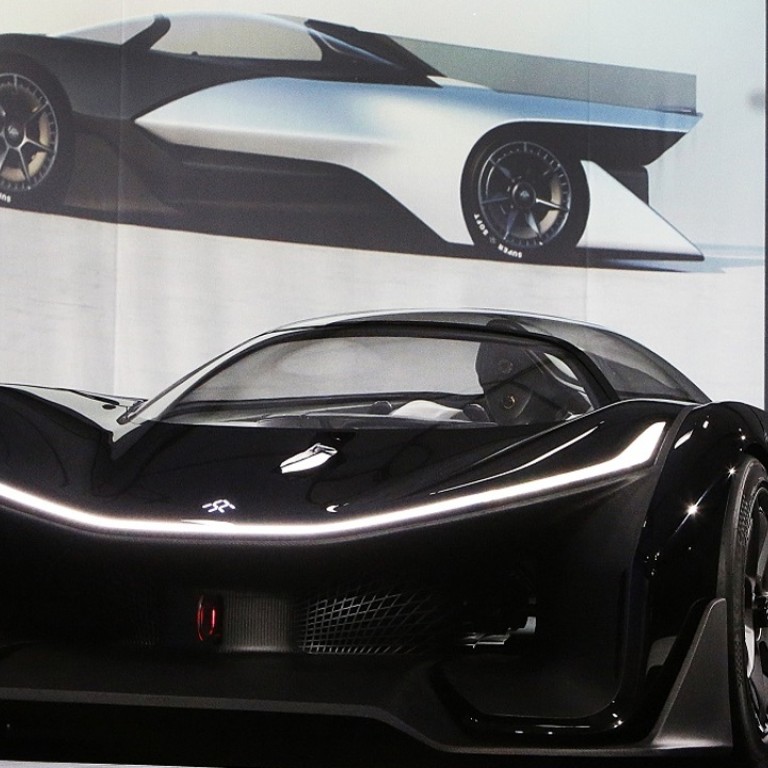
Chinese-backed electric car maker Faraday Future unveils Batmobile-like FFZERO1 concept that can be put together like Lego
Futuristic supercar’s modular design allows various parts of vehicle to be modified while also lowering production costs, hailed as industry standard of the future
Electric car start-up Faraday Future (FF) made a new splash by unveiling its FFZERO1 concept vehicle that looks tailored to suit caped crusaders at a pre-CES event in Las Vegas on Tuesday.
Founded in 2014, the US company is backed by Chinese entertainment portal Letv and is widely considered the top domestic threat to Tesla as both have ambitious growth plans for their home market.
Moreover, Faraday will start building a US$1 billion factory in the desert- and casino -rich state of Nevada in the next few weeks, said Nick Sampson, its senior vice president. The company employs over 550 people in the US and at least another 200 internationally.
With what looks like a windshield designed for a fighter jet and air intakes for a front grille, the FFZERO1 looks slick - probably too slick for many motorists - and comes with a top speed of 200 mph. The company said it will get to 60 mph in three seconds.
But Faraday did not show a working prototype, and the video it presented appeared to be animated.
Faraday had another trick up its sleeve, however, in announcing that the electric cars of the future will be assembled much like Lego bricks - at least those that it plans on making.
The company has designed a basic car structure which it has dubbed Variable Platform Architecture (VPA) where the number of batteries, length of the chassis and number of motors can all be changed according to the size and intended use of the final product.
READ MORE: Is world on the brink of an electric car revolution?
“We have the potential to deliver an extremely diverse range of vehicles faster and more efficiently than previously thought possible,” said head designer Richard Kim, who also designed the BMW i3 and i8 concept cars before joining Faraday.
Electric cars can use a modular design because they have a much simpler structure than traditional fuel-burning vehicles, said Ma Song, a new energy vehicle analyst in China who works for Guolian Securities, a Hong Kong-listed brokerage.
“A modular design standardises different parts of the car and will lower the cost of production,” he said.
“This is the future of electric cars”
Another move that sets the company apart is that it is building its own factory instead of partnering with other manufacturers, which industry insiders view as a bold but risky move.
One engineer from an electric car start-up in Beijing said the risks are high because of all the skilled engineers, automated production lines and other costs involved.
“That’s why most start-ups in the electric car field focus on design and operation instead of production,” said the man, who declined to be named.
Although the venture is costly, Faraday has received backing from China’s Letv, which “will bring new investors and help enter the significant market of China,” said Sampson.
READ MORE: Tesla ‘negotiating’ with China on making electric cars locally as domestic demand may match the US in ‘five or six years’
The company confirmed its partnership with Letv when Ding Lei, co-founder of Letv’s electric car venture, appeared on stage at the event in Las Vegas.
He said Letv wants to get the online infrastructure in place to connect the vehicle with other cars of the future.
“This is typical of Letv,” said Frank Sun, a car blogger and executive at a Chinese branch of a multinational car company. He asked that his company not be named.
“The car is at a very early stage and so is its business plan,” he said.
“Letv will do what it does best: attract attention, raise money and then start working.”
Letv runs a famous Netflix-like site in China and sells its own smartphone and smart TV. It is famous for making aggressive investments in content and new businesses.
The company recently announced a HK$2.2 billion (US$283.82 million) investment plan for Chinese TV maker’s TCL’s new media business.
Letv made a profit of 370 million yuan in the first three quarters of last year, it said.

